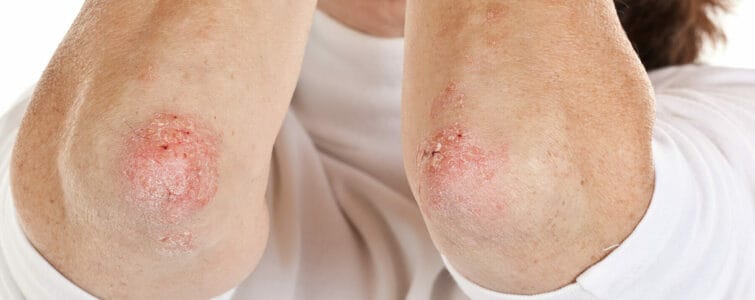
Do you suspect that you might suffer from rheumatoid arthritis?
Have you noticed that you have some weird symptoms – like swollen and stiff joints?
Well, these unexpected symptoms could mean something.
Could it be RA?
Well, here are 8 unusual signs of rheumatoid arthritis that you probably haven't heard of.
Note. This guide is based on my own research on the unusual symptoms of RA.
1. Skin Problems
Have you noticed a rash on your skin?
At first you thought that you should see a dermatologist, right?
A rash on your skin is a dermatological problem, after all.
Yet, have you thought that maybe your problem is related to rheumatoid arthritis?
Don't panic – it doesn't necessarily mean that you suffer from RA.
However, it is one of the less common signs of this condition.
Moreover, there are other skin issues that can be a symptom of this bone problem:
- hives
- bruising
- nodules
- tiny purple, red or brown spots
- wounds that do not heal
- cold, discolored finger or toes
Let's start with the first condition on our list, hives.
Do you know what this is? Well, it is also known as urticaria.
Basically, it is a skin reaction that causes itchy welts or bumps.
How are the hives caused by RA different from the ones that have other causes?:
- are not caused by an allergy to the medication
- can become chronic (can last between six weeks to several months)
- are uncomfortable and difficult to treat
Now, let's talk a little bit about bruising.
Everybody knows what a bruise looks like, so there's no need to describe it for you, right?
Also, let's clarify something.
We're not talking about the bruises that appear after you hit your leg, for example.
These are pretty common. Instead, I'm referring to bruises that are unusual:
- you notice excessive bruising
- you get bruises even if you weren't hit by something
These types of bruises could actually caused by rheumatoid arthritis.
So, they are a symptom that should be taken into consideration.
What else can you observe? Well, you can also see some nodules:
- look like firm lumps
- they develop under the skin
- appear near the affected joints
Beside nodules, you can also experience some red spots.
These are called petechiae and they can appear for various reasons.
However, this can also be one of the symptoms of rheumatoid arthritis.
I don't think I need to explain more the two last skin problems that I mentioned here.
I refer to wounds that do not heal and discolored fingers.
It is pretty clear what I want to say with that.
Yet, I actually want to tell you one more thing.
People who suffer from RA can also develop psoriasis. [1]
What is psoriasis?:
- a skin disease
- causes a rash with itchy, scaly patches
- appears usually on knees, elbows, and scalp
Keep in mind, these symptoms are not that common when it comes to RA.
So, it is better to look for other signs in order to know what problem you are dealing with.
Do not draw a conclusion based only on just one symptom.
SUMMARY
A skin problem might indicate that you suffer from rheumatoid arthritis.
So, you should look for hives, bruises, and other skin issues that you may have.
Also, people who suffer from RA can develop psoriasis as well.
2. Snoring
Have you thought that snoring could be a sign that you suffer from rheumatoid arthritis?
No? Well, snoring and RA can be related.
How come?:
- rheumatoid arthritis affects your lungs
- your snoring might be caused by sleep apnea
- sleep apnea is also related to rheumatoid arthritis [2]
What is sleep apnea?
Well, sleep apnea is a condition that doesn't allow you to breathe properly.
Basically, your breathing stops and starts again when you sleep.
The noise that is produced by sleep apnea is called snoring.
Did you understand?
I know, it might be a little bit difficult to see the difference between sleep apnea and snoring.
In other words, snoring can be caused by sleep apnea.
That's why:
- all the people who suffer from sleep apnea snore
- but not all snorers have sleep apnea
Moreover, both snoring and sleep apnea can be caused by rheumatoid arthritis.
As sleep apnea doesn't allow you to breathe properly, you might experience other symptoms as well:
- headaches
- fatigue
Why is that so? Well, that's because at night your organism doesn't get enough oxygen.
Can sleep apnea be treated?
Definitely! However, you need to see a doctor first!
After that, you might receive a device that allows your body to get the oxygen that it needs.
So, snoring can be a sign that you suffer from rheumatoid arthritis, right?
Yes, it can be. Yet, look for more signs. Don't start to worry immediately!
SUMMARY
Rheumatoid arthritis can cause sleep apnea and, obviously, snoring.
That's because it can affect your lungs and the way you breathe.
So, make sure that you are looking for this unusual sign if you want to discover your problem.
3. Hearing Issues
“How are hearing and RA related?” you may ask.
At first, there seems to be no connection between the two of them.
However, one of the symptoms that you may have is hearing problems.
What do I mean by hearing problems?:
- hearing loss [3]
- tinnitus
Do you know what tinnitus is?
Actually, tinnitus is the medical term for the condition known as “ringing in the ear”.
When you suffer from tinnitus you might hear various sounds like:
- hissing
- roaring
- buzzing
- whistling
Are these sounds real?
Well, even though they might seem real to you, there is no external sound source.
For this reason, they are also known as phantom sounds.
Moreover, this condition can affect one or both ears.
Yet, how is this related to rheumatoid arthritis?
Well, you might experience hearing problems because you suffer from RA.
How come? There are more reasons why this happens:
- because of the inflammation caused by RA
- RA affects the bones and joints in the inner ear
- you may develop a condition called autoimmune inner ear disease (AIED)
- a rheumatic nodule can develop inside the ear
What is AIED? It is one of the diseases that leads to hearing loss.
Basically, your immune system attacks the structure of your inner ear.
The area which was attacked inflames, which can result in hearing loss.
So, as you can see RA does not affect only joints, but other parts of your body too.
One of them is the ear.
So, you can consider this a sign that tells you that you might suffer from RA.
SUMMARY
Rheumatoid arthritis can affect the ears as well as other parts of the body.
So, you can experience symptoms like hearing loss or buzzing in the ears.
This happens because RA affects the bones from your inner ear.
4. Numbness
Another less common symptom that you might experience is numbness in your feet and hands.
How would you describe numbness?
Actually, numbness is when you lose the sensation or feeling in a part of your body.
You probably experienced it at least once in your life.
Did you happen to sit in one position for a long time and after that to have numb legs?
Well, we are not talking about this type of numbness that occurs from time to time.
I'm referring to long-term numbness.
This is related to rheumatoid arthritis and has more causes:
- peripheral neuropathy [4]
- carpal tunnel syndrome
I know, these medical terms are hard to understand.
But I'm going to explain them more to you, don't worry.
Let's start with the first condition that I mentioned here, peripheral neuropathy.
Peripheral neuropathy is basically a type of nerve damage.
It can cause numbness, pain, and even muscle weakness in your:
- arms
- legs
- feet
- hands
Actually, this nerve problem can appear if you suffer from RA.
Why is that? Well, there are many reasons for that:
- the inflammation of your joints
- the pressure on nerves that run through your joints
So, as you can see, rheumatoid arthritis influences the health of your nerves as well.
In fact, there is another condition that might affect your nerves.
It is called carpal tunnel syndrome. Do you know what this is?
Well, it is a condition that can cause numbness, tingling, and a burning sensation in your thumbs and fingers.
How is this related to RA?:
- carpal tunnel syndrome appears as the result of a compressed median nerve in the wrist
- RA can lead to inflammation in the wrist
- it can also lead to bone spurs that press against the median nerve
- this can result in the development of carpal tunnel syndrome
So, if you notice that your feet or hands are numb for no apparent reason, then you may suffer from RA.
This might be an unusual sign of rheumatoid arthritis, but it can occur.
Thus, pay attention to your body and you might find your answer.
SUMMARY
Numbness is another sign that you might be suffering from rheumatoid arthritis.
It is also related to some nerve problems like peripheral neuropathy and carpal tunnel syndrome.
So, beside numbness, you might also experience pain and muscle weakness.
5. Irritated Eyes
Have you noticed that your eyes are more irritated than usual?
Or do you feel that they are rather dry?
Surprisingly, this is another sign that you might suffer from rheumatoid arthritis.
Actually, the eyes can also be affected by RA, so you might experience a variety of symptoms.
Which are those? Well, let's have a look at them:
- red and inflamed eyes
- dry eyes [5]
- eye pain
- swelling
- a blurry vision
- light sensitivity
- colors that seem faded
- watering eyes
What is the relationship between eyes and rheumatoid arthritis?
Well, as I mentioned before, this disease doesn't affect only joints, but other parts of the body too.
So, RA can cause inflammation of the tear gland.
What happens then? Your eyes become dry and irritated.
In fact, there is also a name for this condition, “dry eye syndrome”.
However, should you worry every time your eyes are dry and irritated?
Of course not! There are many causes of eye dryness.
Yet, pay attention to these signs:
- eye dryness is recurring, persistent, or severe
- you observe a change in vision
The other symptoms like pain or swelling also show that your eyes were affected by RA.
So, if you experience such symptoms, you can think that you might suffer from rheumatoid arthritis.
SUMMARY
As rheumatoid arthritis might also affect your eyes, you can experience other unusual symptoms.
Your eyes might become dry and inflamed or you may have blurry vision.
That's because RA can cause inflammation of the tear gland.
6. Lung Problems
Another part of the body that can be affected by rheumatoid arthritis is the lung.
As you know, our lungs are very important for our organism.
Unfortunately, RA can also affect them. [6]
If you have lung problems, you might experience different symptoms.
Which are those? Well, let's have a look at them:
- shortness of breath
- chronic cough
- fatigue
- weakness
- chest pain
Let's stick to them a little bit and find out more details about them.
These symptoms might indicate that you have different lung problems:
- lung scarring
- pleural effusion
- pulmonary nodules
Let's start with the first one, lung scarring.
Lung scarring is a condition caused by chronic inflammation of the lungs.
It can cause different symptoms – like chronic cough and fatigue and/or weakness.
As you know, the chronic cough doesn't go away with the usual drugs for coughing.
The second lung problem that you might develop is pleural effusion.
This is also a condition related to RA:
- the symptoms are shortness of breath accompanied by fever and/or chest pain
- refers to the excess of fluid that builds up around the lungs
The third issue that I'm going to talk about here is pulmonary nodules.
As you probably know, nodules are small growths that appear in different parts of the body.
This time, they can be found in the lungs.
So, if you experience some of the symptoms mentioned here, you might suffer from RA too.
Of course, not every lung problem is related to rheumatoid arthritis.
Yet, there can be a connection between the two.
So, pay attention to your symptoms and to your body!
SUMMARY
A lung problem might also indicate that you suffer from rheumatoid arthritis.
That's because the lungs can also be affected by this condition.
So, you might have symptoms like chronic cough, chest pain, and shortness of breath.
7. Insomnia
Do you have trouble sleeping at night?
Well, I have to tell you that insomnia can also indicate that you suffer from rheumatoid arthritis.
“Is this true? Can RA influence even my sleep pattern?” you may ask.
Well, I can assure you that this information is accurate.
How come?:
- sleep disturbance is one of the symptoms of rheumatoid arthritis [7]
- this is linked to the severity of the disease
- the pain and inflammation caused by RA, can also negatively influence your sleep
So, insomnia can definitely indicate that you might suffer from rheumatoid arthritis.
Also, sleep disturbances influence your overall health.
Thus, during the day you might experience the following symptoms:
- daytime sleepiness
- fatigue
- anxiety
- depression
As you know, sleep is very important for your organism.
If your body can't rest properly, you might develop other problems like the ones mentioned.
So, rheumatoid arthritis causes insomnia and insomnia triggers other problems.
In order to break this vicious circle, it is important to find out the cause.
So, look for more symptoms to discover what your problem is.
SUMMARY
A sleep problem is also a sign that you may be dealing with rheumatoid arthritis.
So, here we can include insomnia and a sleep disturbance.
The cause for these issues can be RA and the pain that comes with it.
8. Changes In Your Weight
Changes in your weight can be a symptom of numerous diseases.
Yet, this can also indicate that you might be suffering from rheumatoid arthritis.
What do I mean by changes in your weight?
Well, you can either gain or lose a lot of weight without intending to do so. [8]
What influences the changes in your weight?
- your symptoms
- your overall health
- your organism
So, if you lose or gain weight depends on more factors.
However, it is certainly clear that rheumatoid arthritis influences your weight.
What happens when you gain weight?:
- your muscle mass decreases
- that happens because you can't exercise much
- your body fat increases
In other words, because your joints are painful and inflamed, you can't exercise.
So, you gain weight, logically speaking.
What happens when you lose weight?:
- weight loss might be a side effect of inflammation (caused by RA)
- your appetite decreases
- you lose muscle mass
So, if you notice that your weight has changed without any reason, you might suffer from RA.
Of course, you should have other symptoms as well.
However, rheumatoid arthritis can definitely be one of the causes of that.
SUMMARY
Rheumatoid arthritis can also influence your weight.
So, weight gain or loss can also be a less common symptom of RA.
The causes for this are various and can be related to rheumatoid arthritis.
My Final Verdict
Do you think that you may be suffering from rheumatoid arthritis?
Did you observe that your joints are stiff and painful, but you also have other symptoms?
Here are 8 unusual signs of rheumatoid arthritis that you should know about:
- Skin problems
- Snoring
- Hearing issues
- Numbness
- Dry eyes
- Lung problems
- Insomnia
- Changes in your weight
These symptoms might indicate that there is a problem with your organism.
That problem can be rheumatoid arthritis, which affects more than your joints and bones.
So, pay attention to your body and see what it tells you.
References:
1. https://pubmed.ncbi.nlm.nih.gov/27388027/
2. https://www.ncbi.nlm.nih.gov/pmc/articles/-PMC2899654/
3. https://pubmed.ncbi.nlm.nih.gov/-33021510/
4. https://pubmed.ncbi.nlm.nih.gov/-33663170/
5. https://pubmed.ncbi.nlm.nih.gov/-32388745/
6. https://pubmed.ncbi.nlm.nih.gov/-26599384/
















